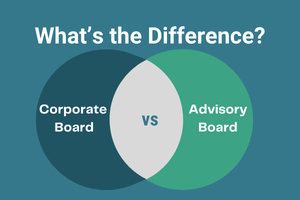 There is a lot of confusion amongst new entrepreneurs on the subject of advisory boards versus corporate boards of directors. Some of that confusion is justified because there is some conceptual overlap. But they are very different animals.
There is a lot of confusion amongst new entrepreneurs on the subject of advisory boards versus corporate boards of directors. Some of that confusion is justified because there is some conceptual overlap. But they are very different animals.
Think of it as a superset/subset relationship: a good board will provide some of the advice and guidance of an advisory board, but corporate boards also provide essential corporate governance, oversight and controls which are not the provenance of an advisory board. Corporate boards regularly meet face to face, whereas advisory boards generally do not. Advisory “boards” usually consist of individual advisors who have one-to-one relationships with the CEO and provide guidance and advice through less formal channels.
Once entrepreneurs grasp these distinctions, their first questions are: “Which one do I need, and when do I need it?”
Corporate Boards
In a theoretical world, a company would have a functioning corporate board right from inception. And technically it does under the law of the state in which it is formed, but at the beginning there are usually a bare minimum number of board seats, and they are typically held by the officers. These “day one” boards generally don’t meet and typically do only the minimum paperwork required by law. For a bootstrapping company struggling to build a prototype or find a product market fit, a formal board is functional overkill. Typically, raising outside funds (debt or equity) or gaining meaningful revenue are the triggers for beefing up a corporate board of directors.
Advisory Boards
Advisory boards, on the other hand, can be an essential source of advice, guidance, technical know-how and industry connections from day one. The power of an advisory board is hard to overstate – in some situations, they can absolutely make a company’s success via key customer introductions or investor connections or critical industry credibility.
Why are advisory boards so useful? Because a good advisory board is more focused on mentorship, growth, development and strategy, rather than reporting, governance, controls and the avoidance of downside risk. A great corporate board will try to focus on growth and development too, but as noted, they are not up and running in the early days and even when they are up and running, their governance responsibilities cannot be avoided, and can get in the way or at least take up a fair amount of board time. So in the early days the advisory board has an out-sized responsibility for mentorship and advice.
How does an entrepreneur go about finding these advisors and mentors? Some he or she will already have, even if they didn’t call them an advisory board member by name. They could be former professors, former bosses, relatives with industry connections, other people who know you well. The rest they get by networking. Since advisors can make an incredibly big difference, entrepreneurs should pursue great advisors with vigor. They need to assess where they are weak and need help, then ask everybody they know for suggestions on people who can help. Entrepreneurs should meet with potential advisors to see if they are a fit – even if they are not, the meeting will probably be helpful, and if it’s not, it is still valuable networking.
In selecting advisory board members, entrepreneurs should look for inter-personal chemistry, passion for the company’s focus area, capability to help, time and willingness. In some cases, there will be an exception for people who are really just lending their name and credibility and don’t contribute much time beyond the very occasional consultation – more on that below. But for the most part, entrepreneurs are looking for people who want to jump in, help out, and be there for them in the clinch.
Chief Synthesizing Officer
One note of caution: in running around and seeking all this advice, entrepreneurs and advisors must keep in mind that it is just advice. People’s opinions. It’s the entrepreneur’s company, it’s their vision, and they are the one who has been listening to the customers. Consider the case of new parents. The first couple times they go to the pediatrician, the doctor is undoubtedly the expert – the parents have no idea how to operate their new infant. But after living with their baby for a while and getting to know its quirks, the parents gradually begin to have increasingly strong instincts about what is going on – gas bubbles or something really wrong. Same thing happens to an entrepreneur with her company. If an advisor tells her to go in a direction that is strongly against her gut, she should get a second opinion. Maybe a third. She needs to synthesize what she is hearing with what she knows about her customers and what she is seeing in her market with her own eyes. Entrepreneurs shouldn’t let anyone talk them out of pursuing their dream or talk them into ruining their dream.
In terms of setting up an advisory board, here is a list of key issues for you to consider:
- Paying Advisory Board Members
- Length of Advisory Board Terms
- Making Your Advisory Board Work
- Confidentiality
- Exclusivity/Non-Compete
- Publicity
- Use of an Agreement With Advisory Board Members
- Ownership of Ideas
- Other Legalities
For further discussion on directors vs. advisors, check out Steve Blank's article Don't Give Away Your Board Seats.
Want to learn more about the roles and responsibilities of Directors? Download this free eBook today! Director's Guidebook: How to be an Effective Board Director in Early Stage Companies.

